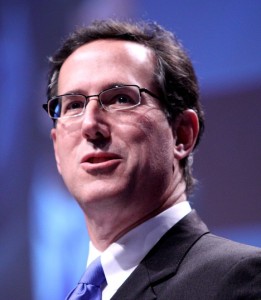Gay Soldier Booed at GOP Debate: What Will Independent Voters Think?

Although the Republican candidates are making sure that there are enough zingers to make the frequency of the primary debates more tolerable than they otherwise would be (thank you, Gary Johnson), the audience has also sparked comment in the past two debates. First, there were cheers after a question about whether an uninsured man should be allowed to die. Then the audience made news again last night, when a handful of people booed a question from Stephen Hill, a gay man currently serving in the Army in Iraq, who asked the candidates how they’d handle the repeal of Don’t Ask, Don’t Tell (DADT).
Rick Santorum, who answered the question, came under fire for neglecting to thank Mr. Hill for his service as well as for failing to rebuke the audience members. Instead, Santorum said that he would reinstate DADT, claiming that “social experimentation” would render the military ineffective. Almost a day later, he denounced the boos and said he could not hear them from the stage, a claim that the Atlantic points out could be true.
In the interim, prominent Republicans spoke out, both against Santorum and the audience. Former press secretary Ari Fleischer, who served under George W. Bush, tweeted, “Booing a soldier serving our nation is uncalled for. If I were on stage, i would make that point.” The Log Cabin Republicans, a national gay and lesbian Republican organization, released a statement saying that they were “disgusted” by Santorum’s “shameful” response.
As usual, though, it’s harder to know what people watching at home were thinking, even though Google was doing its darndest to make last night’s debate more interactive. In our recent report, “Generations at Odds: The Millennial Generation and the Future of Gay and Lesbian Rights,” we found that 62% of Republicans supported laws that would protected gays and lesbians from job discrimination (compared to 76% of Democrats and 74% of independents) and while nearly half (49%) of Republicans said that they believed that gay and lesbian relationships should be accepted by society (compared to 73% of Democrats and 68% of independents).
A survey conducted by the Pew Research Center last November, before DADT was repealed, revealed that Republicans are similarly divided on this policy issue, with 40% in favor and 44% opposed. This contrasts sharply with the large majorities of Democrats and independents who support allowing gays to serve openly (70% and 62%, respectively).
The numbers show that while Republicans watching the debate at home may not have been bothered by Santorum’s response, the boos from the crowd and simultaneous lack of a response from any of the other candidates may stick in independents’ minds when the general election rolls around. But then again, who knows what will happen at the next debate?

